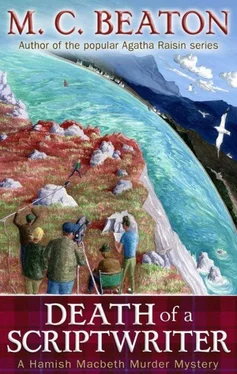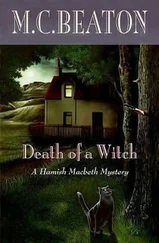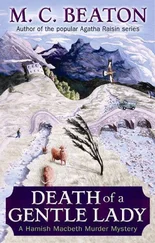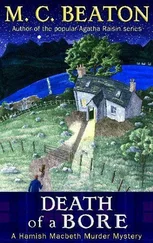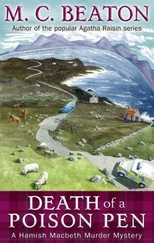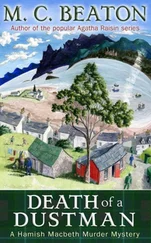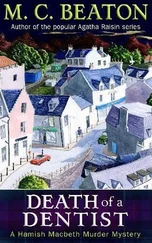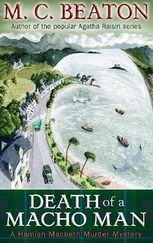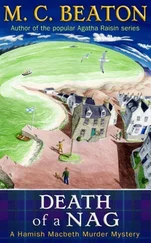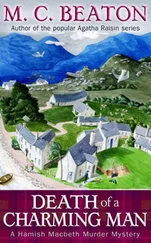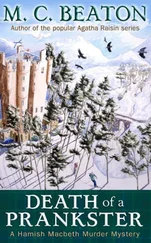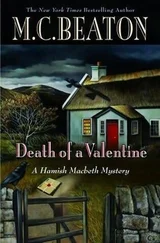M.C. Beaton - Death of a Scriptwriter
Здесь есть возможность читать онлайн «M.C. Beaton - Death of a Scriptwriter» весь текст электронной книги совершенно бесплатно (целиком полную версию без сокращений). В некоторых случаях можно слушать аудио, скачать через торрент в формате fb2 и присутствует краткое содержание. Жанр: Старинная литература, на английском языке. Описание произведения, (предисловие) а так же отзывы посетителей доступны на портале библиотеки ЛибКат.
- Название:Death of a Scriptwriter
- Автор:
- Жанр:
- Год:неизвестен
- ISBN:нет данных
- Рейтинг книги:5 / 5. Голосов: 1
-
Избранное:Добавить в избранное
- Отзывы:
-
Ваша оценка:
- 100
- 1
- 2
- 3
- 4
- 5
Death of a Scriptwriter: краткое содержание, описание и аннотация
Предлагаем к чтению аннотацию, описание, краткое содержание или предисловие (зависит от того, что написал сам автор книги «Death of a Scriptwriter»). Если вы не нашли необходимую информацию о книге — напишите в комментариях, мы постараемся отыскать её.
Death of a Scriptwriter — читать онлайн бесплатно полную книгу (весь текст) целиком
Ниже представлен текст книги, разбитый по страницам. Система сохранения места последней прочитанной страницы, позволяет с удобством читать онлайн бесплатно книгу «Death of a Scriptwriter», без необходимости каждый раз заново искать на чём Вы остановились. Поставьте закладку, и сможете в любой момент перейти на страницу, на которой закончили чтение.
Интервал:
Закладка:

M.C. Beaton
Death of a Scriptwriter
Hamish Macbeth #14
1999, EN
∨ Death of a Scriptwriter ∧
1
Alas, that Spring should vanish with the Rose!
That Youth’s sweet-scented Manuscript should close!
—Edward Fitzgerald
Patricia Martyn-Broyd had not written a detective story in years. In her early seventies she had retired to the Highlands of Sutherland on the east side of the village of Cnothan, to a trim, low, whitewashed croft house. She had now been living in the outskirts of Cnothan for five years. She had hoped that the wild isolation of her surroundings would inspire her to write again, but every time she sat down in front of her battered old Remington typewriter, she would feel a great weight of failure settling on her shoulders and the words would not come. For the past fifteen years her books had been out of print. Yet her last detective story, published in 1965, The Case of the Rising Tides , featuring her Scottish aristocrat detective, Lady Harriet Vere, had been a modest success.
Patricia looked remarkable for her age. She had a head of plentiful snow white hair, a thin, muscular, upright figure and square ‘hunting’ shoulders. Her nose was thin and curved like a beak, her pale blue eyes hooded by heavy lids. She was the daughter of a land agent, dead many years now, as was her mother. Patricia had been head girl in her youth at a school more famed for the titles of its pupils than for educational standards. A crush on her English teacher had introduced her to reading detective stories, and then, after an unsuccessful spell on the London scene as a debutante, she had decided to write.
She had never forgotten the thrill of having her first book published. Her plots were complicated and thoroughly researched. She was fond of plots involving railway timetables, the times of high and low tides and London bus routes. Her main character, Lady Harriet Vere, had grown up, as Patricia herself had grown up, in a world where everyone knew their place in society and what was due to their betters. Light relief was provided by a cast of humorous servants or sinister butlers and gardeners and clod-hopping policemen who were always left openmouthed by the expertise of Lady Harriet.
But as the world changed, Patricia stayed the same, as did her characters. Sales of her books dwindled. She had a private income from a family trust and did not need to find other work. She had at last persuaded herself that a move to the far north of Scotland would inspire her. Although her character, Lady Harriet, was Scottish, Patricia had never been to Scotland before her move north. There was a stubborn streak in Patricia which would not let her admit to herself that she had made a terrible mistake and added the burden of loneliness to the burden of failure.
She had recently returned from a holiday in Athens. The weather in Greece had been bright and sunny, and in the evenings, the streets of Athens were well lit and bustling with people. But all too soon it was back to London, to catch the plane to Inverness. The plane had descended through banks of cloud into Heathrow. How dark and dismal everything had seemed. How cold and rainy. How grim and sour the people. Then the flight to Inverness and down into more rain and darkness, and then the long drive home.
The county of Sutherland is the largest, most underpopulated area in western Europe, with its lochs and mountains and vast expanses of bleak moorland. As she had unlocked the door of her cottage, the wind had been howling around the low building with a mad, keening sound. A brief thought of suicide flicked through Patricia’s weary brain, to be quickly dismissed. Such as the Martyn-Broyds did not commit suicide.
Patricia attended the local Church of Scotland, although she was an Anglican, for the nearest Episcopal church involved too long and weary a drive. She could have made friends, but the ones she considered of her own caste did not want to know her, and the ones who did, she considered beneath her. She was not particularly cold or snobbish, and she was lonely, but it was the way she had been brought up. She did have acquaintances in the village, the local people she stopped to chat to, but no close friends at all.
A week after her return from Athens, she still felt restless and so decided to treat herself to dinner at the Tommel Castle Hotel. The hotel had been the home of Colonel Halburton-Smythe, who had turned it into a successful hotel after he had fallen on hard times. Although a hotel, it still had all the air of a comfortable Highland country house, and Patricia felt at home there.
She began to feel better as she sat down in the dining room and looked around. The month was June, and after a grim winter and icy spring, when Siberian winds had blown from the east, bringing blizzards and chilblains, the wind had suddenly shifted to the west, carrying the foretaste of better weather to come.
The dining room was quite full. A noisy fishing party dominated the main table in the centre of the room, Patricia’s kind of people but oblivious to one lonely spinster in the corner.
Then waitresses came in and began to bustle about, putting the remaining tables together to form one large one. A coach party entered, noisy and flushed, and took places round this table. Patricia frowned. Who would have thought that the Tommel Castle Hotel would allow a coach party?
The fact was that the colonel was away with his wife visiting friends, his daughter was in London and the manager, Mr. Johnson, had decided that a party of middle-aged tourists could do no harm.
Patricia had just finished her soup and was wishing she had the courage to cancel the rest of her order when a tall, lanky man came into the dining room and stood looking around. He had flaming red hair and intelligent hazel eyes. His suit was well cut and he wore a snowy white shirt and silk tie. But with it, he was wearing a large pair of ugly boots.
The maître d’ went up to him and Patricia heard him say sourly, “We have no tables left, Macbeth.”
“Mr. Macbeth to you, Jenkins,” she heard the man with the red hair say in a light, amused voice. “I’m sure you’ll have a table soon.”
They had both moved into the dining room and were standing beside Patricia’s table.
“No, not for a long time,” said the maître d’.
The man called Macbeth suddenly saw Patricia watching him and gave her a smile.
Patricia could not quite believe the sound of her own voice, but she heard herself saying stiffly, “The gentleman can share my table if he wishes.”
“That will not be necessary…,” began Jenkins, but the red-haired man promptly sat down opposite her.
“Run along, Jenkins,” he said, “and glare at someone else.”
Hamish Macbeth turned to Patricia. “This is verra kind of you.”
She regretted her invitation and wished she had brought a book with her.
“I am Hamish Macbeth,” he said with another of those charming smiles. “I am the village policeman in Lochdubh, and you are Miss Patricia Martyn-Broyd and you live over by Cnothan.”
“I did not think we had met,” said Patricia.
“We haven’t,” said Hamish. “But you know what the Highlands are like. Everyone knows everyone else. I heard you had been away.” He took the menu from a hovering waitress as he spoke. He scanned it quickly. “I’ll have the soup and the trout,” he said.
“I have just come back from Greece,” said Patricia. “Do you know Greece?”
“I don’t know much of anywhere except the Highlands of Scotland,” said Hamish ruefully. “I’m an armchair traveller. I am surprised you stayed up here so long.”
Читать дальшеИнтервал:
Закладка:
Похожие книги на «Death of a Scriptwriter»
Представляем Вашему вниманию похожие книги на «Death of a Scriptwriter» списком для выбора. Мы отобрали схожую по названию и смыслу литературу в надежде предоставить читателям больше вариантов отыскать новые, интересные, ещё непрочитанные произведения.
Обсуждение, отзывы о книге «Death of a Scriptwriter» и просто собственные мнения читателей. Оставьте ваши комментарии, напишите, что Вы думаете о произведении, его смысле или главных героях. Укажите что конкретно понравилось, а что нет, и почему Вы так считаете.
